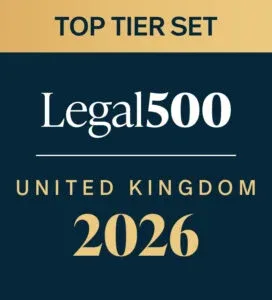Something topical…
In our February 2021 video presentation[1], Sasha Watkinson and I talked about the decision of the Divisional Court in the case of Bell v Tavistock[2]. Bell was concerned with whether and in what circumstances children and young persons under the age of 18 who suffer from Gender Dysphoria can provide informed consent to the prescription of Puberty Blockers (hormone treatment to suppress puberty). The Divisional Court, held, having regard to a number of factors – the poor evidence base for Puberty Blockers, the lack of full and long-term testing, that their use is highly controversial, including within the medical community, and the lifelong and life-changing consequences of the treatment which are in some ways irreversible – that, a child under the age of 16 is very unlikely to be in a position to understand and weigh up those factors so as to provide informed consent. And so, where reliance was being placed on the views of the child, generally-speaking, the matter should be placed before the Court for a best interests decision.
The decision in Bell is subject to appeal and is due to be heard in June 2021.
In the meantime, in AB v CD & Ors[3], Mrs Justice Lieven heard an application by parents (AB and CD) of a child, XY, for a declaration that they as parents have the ability to consent to the administration Puberty Blockers for their child. The Second Respondent was the Tavistock and Portman NHS Foundation Trust (home to GIDS[4]). The Third Respondent was University College London Hospital NHS Trust (“UCLH”)[5].
The Court noted that the legal issues were very different from those in Bell, in that the question of whether parents could consent to treatment was not considered in that judgment as the practice of the Tavistock and UCLH has been not to proceed with the administration of Puberty Blockers on the basis of parental consent alone.
As we noted in our earlier paper, as a consequence of the decision in Bell, the Tavistock has suspended puberty blocker treatment for new patients. However, in respect of patients currently receiving treatment, the Second and Third Respondents have decided that given the extreme distress those patients would experience were the treatment not to continue, then it should continue, provided the parents consent and the child wants the treatment.
The facts in this case were uncontentious. XY was born male. XY had only ever been interested in girls’ toys and clothes. She tried to conform to a more male stereotype but became very unhappy. At the age of 10, and after reading a book where a character was transgender, XY came out to her parents as transgender. Once she started to go to school as a girl she flourished. She was referred to GIDS. XY has fully transitioned socially and has changed her name by deed poll. XY started on Puberty Blockers in July 2019 at which time she was assessed as Gillick competent to consent. There is consensus between the clinicians, XY and her parents that XY, who is now 15, should continue to be prescribed Puberty Blockers.
The issues for the Court were formulated as follows:
-Do the parents retain the legal ability to consent to the treatment (or does it depend on whether their child is Gillick competent or not)?
-Does the administration of Puberty Blockers fall into a “special category” of medical treatment by which either:
-An application must be made to the Court before they can be prescribed?
-As a matter of good practice an application should be made to the Court?
In answering the first question, the Court considered firstly the fundamental and critical role of parents in their children’s lives by a combination of section 2(1) of the Children Act 1989 (parental responsibility), and section 3(1) of the 1989 Act which defines PR “… rights, duties, powers, responsibilities and authority…”. That role extends to granting consent for medical treatment – “… a clear incident of parental responsibility arising from the duty to protect the child…”[6]. Parents can and do make the most serious of all decisions about medical treatment on behalf of their child without recourse to the Courts. Courts will not interfere unless the statutory threshold criteria pursuant to section 31 of the 1989 Act is met, or, in the private law arena, parents cannot agree, or parents feel unable to make a particularly agonising decision themselves.
Do parents retain the right to consent to treatment even if the child is Gillick competent? The Court concluded in the affirmative: the parents’ ability to consent does not disappear once the child achieves Gillick competence, because they retain Parental Responsibility and, thereby, a duty to act in the best interests of their child. The child may be unable to consent through being unconscious, or may decline to make a decision to consent, for example. Parents can and, indeed, should then act. That’s not to say that the parents can use that right to “trump” the Gillick competent child’s views. Although a review of XY’s Gillick competence following the judgment in Bell had not yet taken place, XY clearly wanted the treatment to continue.
In answering the second question, the Court, having reviewed the caselaw, concluded that if a special category of case exists at all for children, it is extremely limited, and should not include as a general rule the provision of Puberty Blockers.
In Court of Protection Guidance[7], the circumstances where there should be an application to the Court for a best interests decision in respect of medical treatment include cases where what is contemplated is a proposed treatment of an experimental or innovative nature, and/or one which involves a significant ethical question in an untested or controversial area of medicine. Mrs Justice Lieven recognised it might be argued that these issues apply to the administration of Puberty Blockers for Gender Dysphoria and so principles applicable to adults lacking capacity should be extended to children. Her Ladyship rejected this (although none of the parties actively argued for such an approach which rather hampered the Court’s assessment). However, Lieven J did observe that these particularly anxious issues in relation to Puberty Blockers may well justify a very cautious approach by clinicians in individual cases and erring on the side of seeking the Court’s authorisation to treatment.
The Court acknowledged the existence of a Regulatory Framework within which, it was argued, the clinical decision to prescribe Puberty Blockers is such that this is the more appropriate mechanism for ensuring best practice, rather than placing Puberty Blockers into a special category requiring Court authorisation and removing the power of parents to consent. The Court was reminded of the number of layers to the Regulatory Framework –
NHS England’s Service Specification (NHS England being the body which commissions the Tavistock and others to provide services and then sets underpinning terms);
an independent review set up by NHSE, chaired by Dr Hilary Cass and which is intended to report this year[8];
individual regulation of clinicians by their own professional bodies;
regulatory oversight by the Care Quality Commission;
ethical oversight of clinical decision-making;
ability of a clinician to apply to the Court if they are concerned about the treatment being proposed.
As to e. and f., the Court gave little weight, given the risk of unanimity of view in this particular clinical field and that neither the Tavistock nor UCLH had ever felt it necessary or appropriate to apply to the Court for the approval of Puberty Blockers to children, even when those children are well below the age of 16.
The Court dipped its toe into an argument that to place Puberty Blockers into a special category of treatment requiring Court authorisation would amount to direct discrimination under the Equality Act 2010, would therefore be incapable in law of justification and thus amounting to discrimination under the Human Rights Act 1998. Mrs Justice Lieven drew back, however, noting that any determination would be obiter, and that a very similar argument might be raised in the Bell appeal.
In conclusion, the Court took particular care to emphasise dicta from the senior judiciary as to the central role which parents must and should play in their children’s lives, and that parents will, in the vast majority of cases be the people who know their children best and who are best placed to make decisions about them. There may be certain, fact-specific cases where perhaps a Court should become involved – where the case is finely balanced or there is disagreement between clinicians. But there should be no general rule that Puberty Blockers should be placed in a special category.
Finally, the Court raised two areas of concern for consideration by regulatory and oversight bodies. Firstly, the division of clinical and ethical views as to the use of Puberty Blockers for children has become highly polarised. And yet, within the structure of the Tavistock and UCLH, that clinical difference of opinion may not be fully exposed. Parents may struggle to obtain a truly independent second opinion. Secondly, pressure may be placed by children with Gender Dysphoria upon parents, making it very hard for parents to refuse to consent. If clinicians suspect pressure is at play, such a case should be brought to Court.
[1] Bell v Tavistock Video Presentation
[2] Bell & Anor v The Tavistock and Portman NHS Trust [2020] EWHC 3274 (Admin)
[3] AB v CD & Ors [2021] EWHC 741 (Fam) (26 March 2021)
[4] Gender Identity Service, a multi-disciplinary service commissioned by NHS England in order to provide specialist assessment, consultation and care for children and young people to reduce the distress of a mismatch between their birth-assigned sex and their gender identity, referred to as Gender Dysphoria.
[5] UCLH works with GIDS to provide paediatric and adolescent endocrinology services to treat patients with Gender Dysphoria.
[6] Per Ward LJ In Re Z (A Minor) (Freedom of Publication) [1997] Fam 1
[7] APPLICATIONS RELATING TO MEDICAL TREATMENT: GUIDANCE AUTHORISED BY THE HONOURABLE MR JUSTICE HAYDEN, THE VICE PRESIDENT OF THE COURT OF PROTECTION [2020] EWCOP 2










